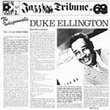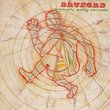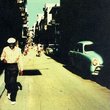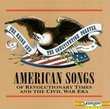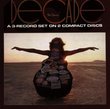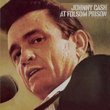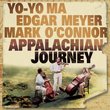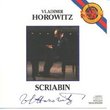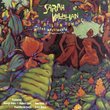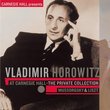| All Artists: Jelly Roll Morton Title: Red Hot Peppers Session Members Wishing: 0 Total Copies: 0 Label: RCA Original Release Date: 8/29/1995 Release Date: 8/29/1995 Genres: Jazz, Pop Styles: New Orleans Jazz, Traditional Jazz & Ragtime Number of Discs: 1 SwapaCD Credits: 1 Other Editions: Red Hot Peppers Session UPC: 078636664125 |
Search - Jelly Roll Morton :: Red Hot Peppers Session
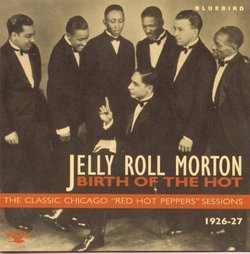 | Jelly Roll Morton Red Hot Peppers Session Genres: Jazz, Pop
Jelly Roll Morton was at a creative peak in Chicago in 1926 and '27, surrounded by first-rate fellow New Orleans musicians and with plenty of opportunities to record. Many of the musicians who contributed to Louis Armstron... more » |
Larger Image |
CD DetailsSynopsis
Amazon.com Jelly Roll Morton was at a creative peak in Chicago in 1926 and '27, surrounded by first-rate fellow New Orleans musicians and with plenty of opportunities to record. Many of the musicians who contributed to Louis Armstrong's Hot Five and Hot Seven recordings appear here--trombonist Kid Ory, banjoist Johnny St. Cyr, clarinetist Johnny Dodds, and his drummer brother Baby Dodds--while George Mitchell contributes sterling cornet leads. Each track is a compressed masterpiece, a jigsaw puzzle of written composition, improvised ensembles, solos and duets, often with sound effects and bantering comic patter thrown in. "Black Bottom Stomp" and "The Chant" are brilliant examples of Morton's energized fusion of contrasting elements, while the piquant "Someday Sweetheart," with its combination of violins, guitar, and Omer Simeon's bass clarinet, demonstrates Morton's inventiveness as an orchestrator. From low humor to high mimicry, Morton was an artist of ebullient spirit who brought the whole of his experience to the recording studio: the car horn of "Sidewalk Blues," the forced laughter of "Hyena Stomp," and the barnyard vocals of "Billy Goat Stomp." By contrast, the final Chicago session includes compact trio performances of "Wolverine Blues" and "Mr. Jelly Lord" by Morton and the Dodds brothers that are refined intersections of ragtime and jazz improvisation. --Stuart Broomer Similar CDs
Similarly Requested CDs
|
CD ReviewsBirth of the Hot: The Essence of Jelly Roll Morton gnsaliba | the U.S. | 07/04/1999 (5 out of 5 stars) "While there are many Jelly Roll Morton recordings on the market today, none are as superbly digitally remastered or include such a fine selection of tunes from Morton. Jelly Roll indeed was his hottest between 1926-27. These songs are IT -- the essence of New Orleans jazz. "Black Bottomed Stomp," "Sidewalk Blues," "Dr. Jazz," "The Chant" -- they're all here. Quite frankly, I have over 100 jazz CD's and this one ranks in my top ten. I could write a paragraph about each song on the album -- from the sizzling clarinet solo in "Black Bottomed Stomp," to the shouting and car horn included in "Side Walk Blues," to the sad melodic wailing in "Dead Man Blues." In recent years, many jazz artists, such as Dick Hyman, have tried re-create these old recordings themselves. But the truth is no one can quite capture that frenetic yet completely coherent excitement that is distinctly Morton. I highly recommend this CD." Jelly serves it up HOT! Ed Brickell | 11/19/1999 (5 out of 5 stars) "Simply some of the best music ever recorded. The opening bars of "The Chant" sound like something Stravinsky would have liked to compose. Sizzlin' soloists, cookin' compositions, the tastiest remastered sound with steamin' highs and punchy lows -- buy it, baby, buy it! Jelly always serves it up hot and smokin'!" One of the very best FloozyFlapper1926 | Somewhere in the 20's | 09/22/2002 (5 out of 5 stars) "As a new fan of jazz, I picked this up to see where it began. Jelly Roll claims to be the father of jazz and this cd will make you think he just might have been. Each of the songs are excellent, masterful and will make even the most stoic person tap their foot. All of them are great and memorable. Jelly Roll played jazz with spirit, pizazz and mastery. One song especially good was "Dr Jazz" because you get to hear him sing but all of them are great. He put his heart into his music and that shows. The sound is also very good and adds to the enjoyment. They truly don't make music like this anymore and this cd will show you that Jelly Roll was one of the best performers of last century. If you want something original and enjoy music from the golden age, pick this up. Its the best!"
|

 Track Listings (23) - Disc #1
Track Listings (23) - Disc #1